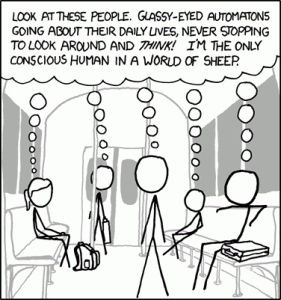Something annoying to me: people taking advice from unsuccessful people. For example, let’s imagine two people, Sarah and Bob. We ask each of them: how can i get straight A’s?
Bob: “It’s easy. You just need to listen in class, take a lot of notes, read through the books, and basically spend every waking moment studying.”
Me: “So Bob, is that how you get straight As?”
Bob: “No I’m not willing to put in the time so I don’t get straight A’s.”
Me: “Well how about you Sarah?”
Sarah: ” Well, in class I use a special note taking method called QEC. It helps me understand rather than memorize. Anything I don’t understand, I put a question mark by it and fill in the answer within a day or two, long before a test. I have a very focused method of studying in which I set definite goals and shut off all outside communication so I don’t get distracted. (… etc etc) I usually finish all my work within a few hours after school, then do whatever. I do get straight A’s with this method.”
Most people are like Bob, they ‘know’ that you need to spend a lot of time studying to get A’s. If you asked Bob for advice, he wouldn’t hesitate to tell you. This annoys the crap out of me because why in the heck would you listen to Bob, who doesn’t have straight As but thinks he knows how to get them? It should be obvious that Sarah is the one to listen to.
This started as a simple ranting blog post, but I came up with a useful tip. Simply restructure your questioning to first ask if someone was successful at what you want to accomplish. For example:
Did/do you get straight As? Were you always a straight A student or did you adopt a strategy? How can I get straight As?
Have you been overweight, then lost that weight and kept it off? How can I lose weight?
Were you ever skinny before putting on all that muscle? How can I put on muscle?
You may have noticed another type of question I inserted into this new structure. For lack of a better idea, I’ll call this the “natural talent eliminator” question. You only want to take advice from people who have been in your situation and worked to get where you want to get. It is not useful to ask someone who is naturally muscular how they put on muscle. Nor is it useful to ask a genius how they study. Nor is it useful to ask someone who is just naturally a stick figure how to lose weight (one reason behind such bad weight loss advice).
So in conclusion, when seeking advice or to learn something, consider using the following structure:
Did you achieve X? Are you just naturally talented/genetically lucky or did you research and develop a specific method to achieve X? How can I achieve X?
